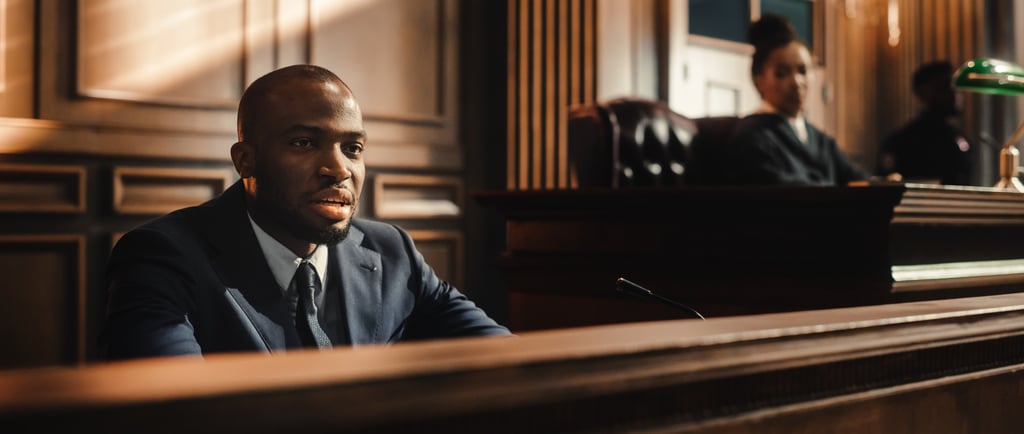Should You Take the Stand at Your Criminal Trial and How to Do It Properly
Should you testify at your criminal trial? Learn the risks, benefits, and how an experienced defense attorney can guide your decision and help you testify effectively if you choose to take the stand.
Mark D. Hauser
6/19/20253 min read


After the Commonwealth (or State) rests in your criminal case you will have a chance to put on a defense by providing evidence and testimony. You can put on witnesses that bolster your case factually and put forth any physical evidence. Another such evidence is YOUR direct testimony, i.e., you taking the stand. But should you? Theoretically, the trier of fact (a judge or a jury) cannot hold it against you if you don’t take the stand because the 5th Amendment of the US Constitution prevents self incrimination (“no person may be compelled to testify against himself”). Call Mark D. Hauser to be your Delaware County criminal defense attorney.
Understanding the Jury’s Perspective on Taking the Stand
The judge is already trained in this concept and explains this concept to the juror members. In addition, the juror during jury selection (called “voir dire”) must agree to this via the initial questionnaire. Whether that actually happens in reality 100% of the time is hard to tell since in the back of everyone’s mind is “if he has nothing to hide why doesn’t he or she take the stand?”
Risks of Taking the Stand as a Defendant
Whether or not the defendant is actually guilty of the crime, more often than not defendants do not take the stand in a criminal trial because of the risks involved. What are the risks you ask? How can a person who is actually innocent of the changes that he is accused of at trial hurt his chances by taking the stand?
The Commonwealth or the State might not have proved their case and by taking the stand, the defendant might help them prove their case if he or she does not perform well on the stand. How’s that? Well first keep in mind that most people get nervous on the stand and often don’t perform well since they are usually not used to that type of environment. As a result, most people are not as good on the stand as they think they will be.
Common Mistakes and Pitfalls on the Stand
People can make mistakes on the stand for many reasons. These missteps can occur whether they are guilty or innocent. Common reasons include:
Imperfect memory: Even honest people may forget details. If they leave something out, it can appear as if they’re lying.
Exaggeration or embellishment: In an effort to help their case, they may exaggerate. This can lead to inconsistencies when compared to other evidence.
Lying due to guilt: A person who is guilty of the charges may lie, resulting in contradictions with the evidence.
Lying despite innocence: An innocent person might lie to hide unrelated actions that are illegal, immoral, or embarrassing (e.g., an affair).
Illogical truth: The witness may be truthful, but if their actions or words don’t make sense to most people, it may come off as dishonest.
Contradicting prior statements: Their testimony may conflict with earlier written or recorded statements (e.g., police statements, texts, emails, or receipts), even if the conflict is unintentional.
When Taking the Stand Might Be Necessary
Obviously if the Commonwealth did not have enough for a conviction without this faulty testimony — this could be a disaster. However, sometimes in a “he said, she said” type of case (rape, assaults) the defendant doesn’t have much choice because otherwise the trier of facts only hears one side of the story. It is not always clear whether the defendant should take the stand but you should generally listen to your criminal defense attorney who has the experience to make this judgement call.
Tips for Testifying Effectively if You Take the Stand
If you do take the stand, here is some advice:
When being cross examined, answer the question directly that is being asked even if it hurts. For example, “Did you shoot the defendant?” “Yes, but he shot at me first, was trying to kill me, and even shot me in the leg.” If you avoid answering directly — which is the mistake most witnesses make (in all types of trials) when they don’t like the question that is being asked — it looks like you are being evasive or are just plain lying. If you ramble on and never answer the question (like most people), the jury or judge will easily notice and you will be criticized during closing arguments.
If you don’t have to give an explanation to your answer to soften the blow (as above), answer as succinctly as possible on cross examination so you don’t blurt out information that might hurt you.
Remember, the Commonwealth is asking questions in areas that they think might help them so you want to speak about those areas as little as possible. The areas that you and your attorney wanted covered (because they help you) should have been covered on direct examination. Don’t worry, if your attorney thinks an explanation is necessary to a question that was asked, he or she can ask a follow-up question on redirect.
For other services including when you need a DUI lawyer in Philadelphia, contact Mark D. Hauser today!
